Croatia Registers 213 New Coronavirus Cases, One Death
ZAGREB, 8 Aug, 2021 - In the past 24 hours, 213 coronavirus cases and one COVID death have been registered in Croatia, the national COVID-19 crisis management team said on Sunday.
There are 1,231 active cases and 175 hospitalised patients, including 18 on ventilators, while 4,100 persons are self-isolating.
To date, 2,352,357 persons have been tested for the virus, including 6,991 in the past 24 hours.
Also, 41% of the population has been vaccinated, including 49.2% of adults, 44.99% of whom have completed vaccination.
For more on COVID-19, follow TCN's dedicated page.
For more about Croatia, CLICK HERE.
Croatia Logs 271 New Coronavirus Cases, No Deaths
ZAGREB, 4 Aug, 2021 - In the past 24 hours, 271 coronavirus cases have been registered in Croatia and there have been no deaths, the national COVID-19 crisis management team said on Wednesday.
The number of active cases is 1,147, including 153 hospitalised patients, 12 of whom are on ventilators, while 3,925 persons are self-isolating.
Croatia has registered 364,244 coronavirus cases to date, including 8,267 deaths and 354,830 recoveries, of which 135 in the past 24 hours.
To date, 2,324,297 persons have been tested for the virus, including 7,996 in the past 24 hours.
Croatia has vaccinated 40.7% of its population, including 49% of adults, 44.48% of whom have completed vaccination.
For more about COVID-19 in Croatia, follow TCN's dedicated page.
Croatia Logs 186 New COVID-19 Cases, One Death
ZAGREB, 3 Aug, 2021 - Croatia has registered 186 new coronavirus cases and one COVID-19-related death in the last 24 hours, the national coronavirus response team said on Tuesday.
The number of active cases currently stands at 1011. Of them, 149 people are receiving hospital treatment, including 11 on ventilators.
Since the outbreak of the epidemic in the country in late February 2020, a total of 363,973 people have been registered as having contracted the virus, of whom 8,267 have died and 354,695 have recovered, including 127 in the last 24 hours.
Currently 4,114 people are self-isolating.
A total of 2,316,301 people have been tested to date, including 7,341 in the last 24 hours.
By 2 August, 3,091,467 doses of vaccine had been administered, with 40.7 percent of the total population and 48.9 percent of the adult population having been vaccinated.
A total of 1,650,326 people have been vaccinated with at least one dose, while 1,493,859 people, or 44.33 percent of the adult population, have been fully vaccinated.
For more about COVID-19 in Croatia, follow TCN's dedicated page.
Coronavirus Antibody Count: How to Check Zagreb Vaccine Results?
August 2, 2021 - With one in ten vaccinated people not developing immunity, how can we know our coronavirus antibody count? TCN reporter Ivor Kruljac found an option in Zagreb and learned whether or not his vaccination was a shot in the dark.
Given that a smaller part of vaccinated people (every 10th vaccinated person) fails to develop proper protection, it's necessary to adhere to the basic measures to prevent infection (maintaining social distancing, mask-wearing, maintaining respiratory and hand hygiene, and going into isolation in the event of the development of COVID-19 symptoms - says the paper containing some basic information about the COVID-19 vaccine I received when taking both doses.
The paper also contains info on how to report side effects and lists some common ones (headaches, developing the shakes, sore muscles, a fever that lasts for a day or two). It also assures that people allergic to food, pollen, insect bites, animal hair, and similar issues can take the vaccine, while those who had a severe reaction to the first dose should either not take the second one or approach it with caution.
With all vaccines having their alleged ups and downs, I opted for Pfizer. Why team Pfizer? Well, the more unserious reasons would be that almost everyone I know at TCN took Pfizer, and I wanted to be cool like them, and also, if it was so good that Croatian elites pushed through to take it earlier in the year, then it is probably good enough for me.
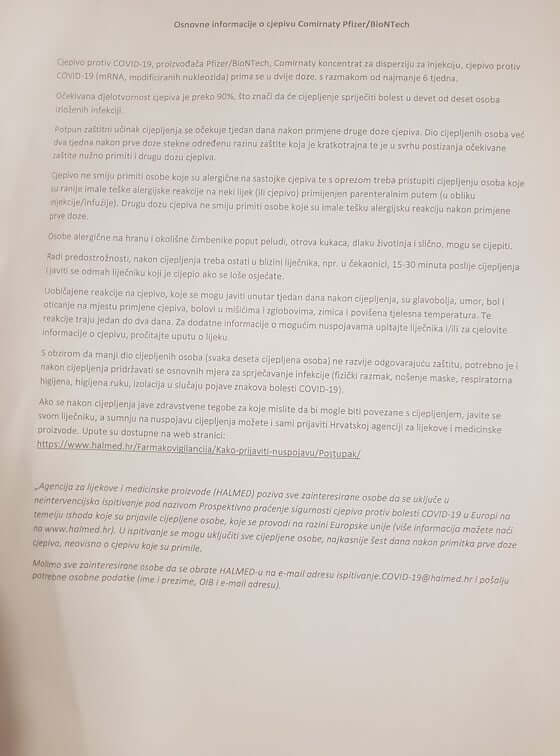
Post-vaccine information paper © Ivor Kruljac / Total Croatia News
Check the data, check yourself
But, on a serious note, as with every vaccine you choose, reading the information from the right sources (such as the WHO that started explaining the different technologies and the types of COVID-19 vaccine back in January as well as updating people about the latest info) is the best way to make the choice you feel most comfortable with.
While we witness many people refusing vaccines as they fall victim to fake news, conspiracy theories, and misinformation, some people refuse it for legitimate reasons. Those who suffer from blood clots have more than fair issues and questions about taking the vaccine.
It's worth noting that before you take the vaccine, a staff member will ask you a series of questions about your overall health (do you take any regular medications, have you already had COVID-19, do you have any chronic conditions, did you take antibiotics a month before, etc). Based on your answers, they will determine whether or not you should wait in the presence of medical staff for fifteen minutes, half an hour, or even longer following vaccination, and whether you should even take the vaccine in the first place.
Consulting with your trusty general practitioner and maybe even undergoing a physical examination ahead of vaccination is the best way to be as informed as possible to answer this series of pre-vaccine questions. Paired with general trustworthy vaccine info, your vaccine experience will likely be trouble-free.
Whether your reason for refusing the vaccine is because of a reasonable concern based on the available information and perhaps your current state of health, or because of some rather absurd misinformation, the recently developed situation in the US best presents the efficiency of the vaccine for your personal safety.
As Bloomberg reports, American president Joe Biden warned Americans that COVID-19 is now a pandemic that strikes only those who aren't vaccinated (49% of Americans have been fully vaccinated at the time of writing this article).
''We've still got a pandemic for those who haven’t gotten the vaccination. It’s that basic, it’s that simple, if you’re vaccinated, you’re not going to die,'' Biden said in late July in Cincinnati.
Choose the (un)lucky number
But, let's leave Biden for a second and get back to the issue at hand, one in ten vaccinated people, unfortunately, fails to develop protection against COVID-19. Despite my best efforts, I couldn't really find any solid medical reason as to why that is, but I'll leave that to the scientists and the doctors.
When it comes to the Pfizer vaccine, after my first dose, I felt sleepy, and the moment I came home, I took a really good nap. Was it due to the vaccine or the fact that I had an early morning appointment and I didn't get much sleep the night before? I'm not sure. As for the second dose, I was prepared for a headache and fever. It seems that these side-effects are practically unavoidable when it comes to Pfizer.
The second dose was received on July the 15th, a couple of days went by, and nothing happened. On one hand, that's great, but why am I not experiencing what the majority seem to experience following their second dose? Could it mean it isn't working? Am I number 10? If I was a medical professional I'd have been able to get the vaccine more quickly, and I would get an antibody test to get a better idea of where things stand.
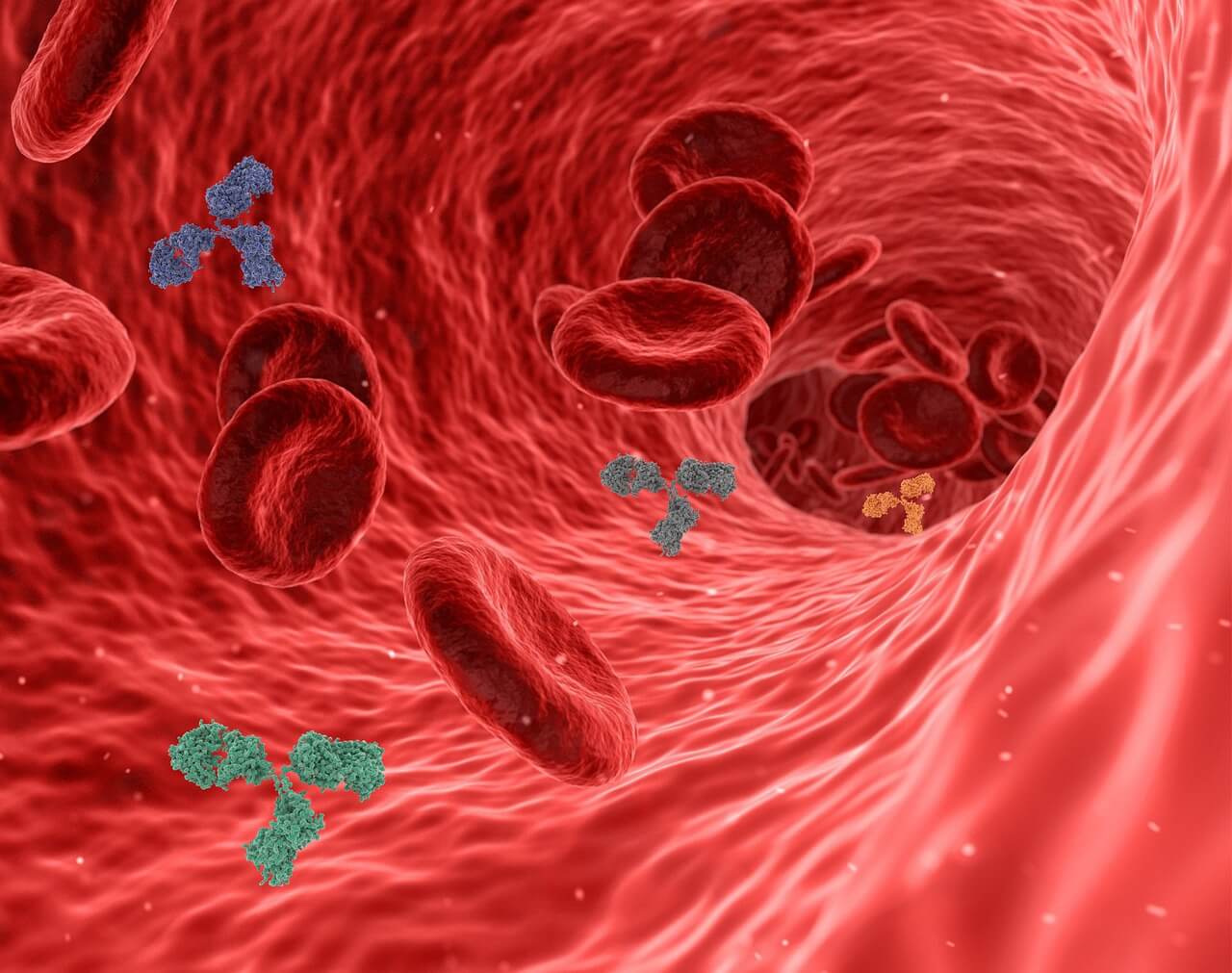
Bloodstream © Pixabay
Public vaccine, private tests
The public healthcare system is one of the values Croats do like, despite their complaints. Pay your taxes and keep healthcare widely accessible. That said, sadly waiting lists can become quite long, and the overall debt left the public unsure whether the required medicines would perhaps be unavailable earlier in 2021. When it comes to non-emergency healthcare services, it may not be the worst idea to go see a private health professional (if you can afford it of course).
One such service is provided by Laboratory Breyer, founded in 1997 by a clinical chemistry specialist, Dr. Darija Breyer.
''Our motivation lies in never-ending research to better our service with the aim of increasing the care provided to our customers. Our best advertisement is the customer experience that serves as a starting point for all future appointments and is a foundation for long-lasting trust in our service. We justify the trust of our customers by expressing the highest concern for their health,'' says their official website.
The accessibility to the service is evident in Breyer now has two locations in Zagreb: Ilica 191 and Ede Murtića 9.
''Polyclinic Breyer is aimed at the customer: quality comes first with both customer and laboratory staff spaces combining maximum efficiency and modern design. Our complete service, starting from the reception to the test result is constantly re-evaluated and monitored. All personnel in both locations are included in all activities regarding quality compliance according to the written procedures and working instructions,'' they explain.
Open for communication; you can learn more and get in touch with the polyclinic here.
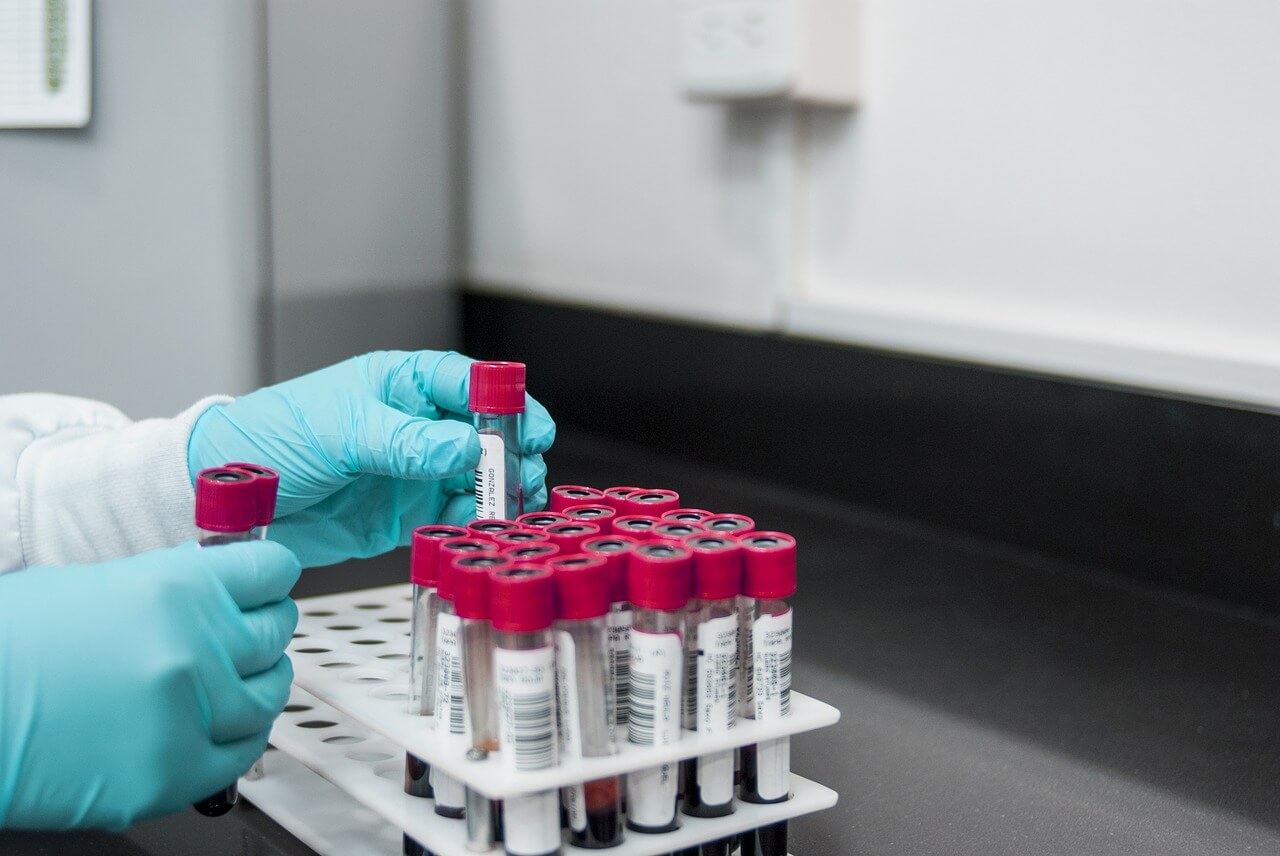
Blood analysis © pixabay
(Anti)body count
The informative piece of paper I received says it takes a week after the second dose to reach immunisation, and that our covid certificates for crossing borders will not allow their holders to avoid testing before two weeks from the second dose have passed. So, the plan is simple, wait two weeks and check your antibody levels.
Additionally, sometime during the late evening hours of the eleventh day after the vaccine, the side effects kicked in. I got a bit of a headache, a low-grade fever, and I experienced a bit of shaking. it was of course not all that pleasant but I welcomed it anyway. My body was reacting, and something was happening. So, should I get my antibody levels tested?
Fortunately, with a private clinic being an option, I had time to make a decision, as no appointment in advance was needed.
''How long has it been since you took the second dose?'' the Laboratory Breyer receptionist asked me when I arrived and I said I wanted coronavirus antibody count.
''Two weeks and one day,'' I replied.
''Hm, it might be a bit too early, the time period needed for immunisation can stretch for a whole month after the second dose, that's usually the best time to do the test,'' the expert kindly explained.
An expert, which I'm not, and you should always accept that you can't be good at everything and that someone always knows better than you about something. Still, I kindly asked if I could take the test anyway. Due to the journey, I'm about to take (which TCN readers will have a chance to learn a bit more about in the following weeks), I wanted to see if something had started happening in my body or not. Alright, the immunisation isn't complete, but if they find at least one little antibody in my bloodstream after two weeks, at least we'll know something had started, right?
My turn came quickly, and the nice lady asked me to take a seat and a vile of my blood was quickly taken. The needle was a bit more painful than a mosquito bite typically is, but at least there was no annoying itching afterward. They said the results would arrive in a couple of hours via email.
They carefully sealed the pierced point and suggested I take a seat in a waiting room. Careful examination of the vein a few minutes later confirmed that all was well. The test took a 220 kuna hit to my paycheck, which isn't that bad, maybe more like a slap.
The sample was taken at 11:09 AM, and results were issued at 15:03, so it was all pretty fast. Despite two weeks not being a long time, I already have 7,236 antibodies. So, the taxpayers didn't waste money on vaccinating me. Hip hip, hooray!
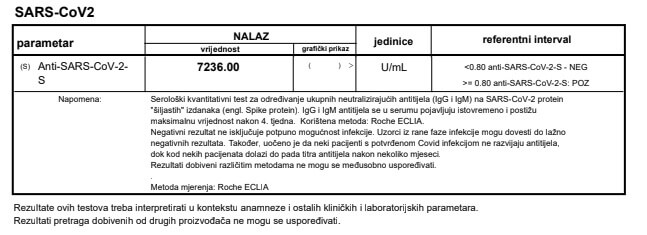
Vaccine efficiency confirmation, screenshot: Ivor Kruljac/TCN
Of course, vaccines don't mean you can't get sick, but the chances of death or developing a severe clinical picture are unlikely. It's nice to know that the one act that has been saving humanity from diseases for centuries works like a charm, and hopefully, more and more people will follow this positive scientific tradition and take the vaccine—both for themselves and for others.
Learn more about health in Croatia, including insurance, what to do in an emergency, and how to find dentists and doctors on our TC page.
For more about COVID-19 in Croatia, follow TCN's dedicated page and choose your preferred language.
COVID-19 Response Team: Share of Infections with Delta Coronavirus Variant Rising
ZAGREB, 30 July 2021- The results of the latest sequencing of samples sent on 20 July show that 13% of the samples were infected with the Alpha coronavirus variant while 84% were infected with the Delta variant, meaning that the share of the new variant in Croatia has continued to grow, the COVID-19 response team has said.
Health Minister Vili Beroš said on Friday that according to the latest map of the European Centre for Disease Prevention and Control, Croatia remained in the orange zone, recording the smallest daily increase in infections in relation to its competition.
"That fact strengthens our status as the safest tourist destination. That gives us reason for satisfaction, but we must remain cautious," he said.
There are over one million tourists in Croatia, which carries an increased risk of disease transmission, the minister said, calling for compliance with restrictions and for vaccination.
He again called on elderly citizens to get vaccinated, noting that mobile teams had been formed to visit elderly people at home and remind them of the importance of getting vaccinated.
Asked if vaccination would be made obligatory for some sectors, Beroš said that that was not likely at the moment and that what prevailed was the proposal for the smart use of COVID-19 certificates to enable work also for people who had not been vaccinated.
Claim for damages over infection, death during hospital treatment
The minister said that for the time being there were no lawsuits against medical institutions over infection with COVID-19 during hospital treatment but he confirmed that a claim for damages had been filed against the KBC Zagreb hospital by a family who believed that their member had died in hospital infected with COVID-19.
KBC Zagreb officials have said that COVID-19 restrictions and professional rules are complied with at the hospital.
"As for whether lawsuits can be expected, probably yes. I can only repeat that since the start of the pandemic we have acted in line with recommendations by the public health institute for safe work in hospitals," the minister said.
Official: Vaccinated people can transmit infection, should wear masks until vaccination rate is high
Reporters asked the head of Zagreb's "Dr. Fran Mihaljević" hospital for infectious diseases, Alemka Markotić, to explain research showing that people who have been vaccinated can spread infection with the Delta coronavirus variant equally fast as people who have not been immunised.
She said that this was not unusual as a person who had been vaccinated was protecting themselves but could carry the virus, which was why experts remained cautious and were not saying that those who had been vaccinated should no longer wear masks.
Public Health Institute (HZJZ) head Krunoslav Capak said that epidemiological rules for the 5 August commemoration of Operation Storm had still not been defined and that they would be known on Monday, and as for the Alka tournament in Sinj, he said that a proposal had been made for participants to have COVID-19 certificates and for the number of attendees to be half the envisaged seating capacity.
The COVID-19 response team will hold its next news conference in three weeks' time, on the condition there are no extraordinary situations.
Croatia Logs 198 New Coronavirus Cases, 2 Fatalities
ZAGREB, 28 July, 2021 - In the past 24 hours Croatia has registered 198 new cases of coronavirus and two people have died as a consequence amid 1,042 active cases, the national COVID response team reported on Wednesday.
There are currently 143 hospitalised patients and 11 of them are on ventilators.
A total of 146 people have recovered over the past 24 hours and 3,267 people are currently self-isolating.
Since 25 February 2020, when the first case of the contagion was identified in Croatia, there have been a total of 363,039 people infected with the novel coronavirus, of whom 8,249 people have died and 353,748 have recovered, 125 of them in the past 24 hours.
To date, a total of 2,281,574 tests have been conducted, including 6,141 taken in the past 24 hours.
By 27 July, a total of 3,031,563 doses of vaccines had been administered, with 40.1% of the total population or 48.2% of the adult population having been inoculated.
Altogether, 1,628,084 people have received at least one vaccine dose, of whom 1,450,537 have been fully inoculated (1,403,476 persons have received two doses and 47,058 have received the single-dose Jannsen vaccine), which makes up 43.05% of the adult population.
For more about COVID-19 in Croatia, follow TCN's dedicated page.
Croatia Logs 193 New Coronavirus Cases, no Deaths
ZAGREB, 27 July, 2021 - Croatia has registered 193 new coronavirus cases and no COVID-related deaths in the last 24 hours, the national coronavirus response team said on Tuesday.
The number of active cases currently stands at 971. This includes 143 people who are receiving hospital treatment, 13 of whom are on ventilators. A total of 3,267 people are in self-isolation.
Since late February 2020, when the first case was confirmed in Croatia, 362,841 people have been registered as having contracted the novel virus, of whom 8,247 have died and 353,623 have recovered, including 146 in the last 24 hours.
A total of 2,275,433 people have been tested for coronavirus to date, including 7,393 in the last 24 hours.
By 26 July, 3,018,451 doses of vaccine against COVID-19 had been administered, with 40 percent of the total population and 48.1 percent of the adult population having been vaccinated. A total of 1,623,475 people have been vaccinated with at least one dose and 1,440,370 of them have been fully vaccinated (1,394,976 have received two doses and 45,394 have been inoculated with the single-dose Jannsen vaccine), which makes up 42.76 percent of the adult population.
For more about COVID-19 in Croatia, follow TCN's dedicated page.
Croatia Reports 125 New Coronavirus Cases, No Deaths
ZAGREB, 25 July, 2021 - In the past 24 hours, 125 coronavirus cases and no COVID deaths have been registered in Croatia, the national COVID-19 crisis management team said on Sunday.
There are 1,009 active cases, including 137 hospitalised patients, 13 of whom are on ventilators, while 3,198 persons are self-isolating.
Croatia has registered 362,621 coronavirus cases to date, including 8,245 deaths and 353,367 recoveries, of which 129 in the past 24 hours.
To date, 2,248,466 persons have been tested for the virus, including 5,979 in the past 24 hours, and 39.9% of population, including 48% of adults, have been vaccinated, of whom 42.45% fully.
HZJZ: Over 3m vaccine doses given without fatal side effects
The Public Health Institute (HZJZ) said today that 3,005,376 vaccine doses had been applied to date and that 1,429,990 persons had been fully vaccinated.
HZJZ director Krunoslav Capak said the HALMED regulator had not received any reports of side effects with a fatal outcome confirmed to have been linked to vaccination. He added that 4,435 reports of suspected side effects had been received to date.
The highest vaccination rate with the first dose has been achieved in Zagreb - 46.1% of the entire population and 55.8% of adults.
Zagreb also accounts for the highest rate of completed vaccination - 40.4% of the city's population and 48.9% of its adult population.
For more on COVID-19 in Croatia, follow TCN's dedicated page.
For more about Croatia, CLICK HERE.
Roma People COVID-19 Vaccination in Croatia: Will Crushed by Disinformation
July 22, 2021 - With the overall struggle to get Croatians to take the coronavirus vaccine, it is often overlooked regarding Roma people COVID-19 vaccination in Croatia.
Despite coronavirus infections being low at the moment, the situation is tense. On July 5, as TCN reported, only 35% of the Croatian population was vaccinated as the Delta strain spreads globally and in the country.
"Unfortunately, we aren't satisfied with the percentage of vaccinated people we hoped to have. We all wanted to vaccinate more than 50 percent of the total Croatian population during June, but sadly our numbers in that regard are much lower. Only about 35 percent of the total Croatian population has been vaccinated, which isn't enough for them to be calm and to be able to live according to the old normal,'' said epidemiologist Dijana Mayer back then. This was punished with the Croatian coast no longer being in the green, and without bigger vaccination interest, things can turn red. As TCN wrote, there are 5-6 Positive Cases at Split Airport every day, and new measures are introduced to British tourists as the Delta strain is booming there (but in a less fatal manner because of vaccines). Stricter measures, in general, can be excepted by the end of the month in Croatia too.
Fortunately, things got better in July. As reported on Wednesday, „Croatia administered nearly three million vaccine doses. Thus, 1.6 million people have received at least one dose of vaccines against COVID-19, and 1,388,674 have fully been vaccinated (1,349,652 have been double-jabbed plus 39,022 who have received a single-dose Jannsen vaccine), and this makes up 41.24% of the adult population“.
But, disinformation about COVID-19 vaccines is vividly spread (just as disinformation about COVID-19), leaving Croatian fact-checking site Faktograf knee-deep in debunking work. Many Croatians sadly believe the fake news of the anti-vaxxers, and the situation culminated to the point where the Croatian officials (as officials in many other EU countries that also struggle with anti-vax propaganda) seriously discuss obligatory vaccination. Will it happen? Some politicians are up for it, others no, but overall, the situation is uncertain as the fourth infection wave approaches, and the season could potentially be in jeopardy in mid-August, as 24 Sata writes.
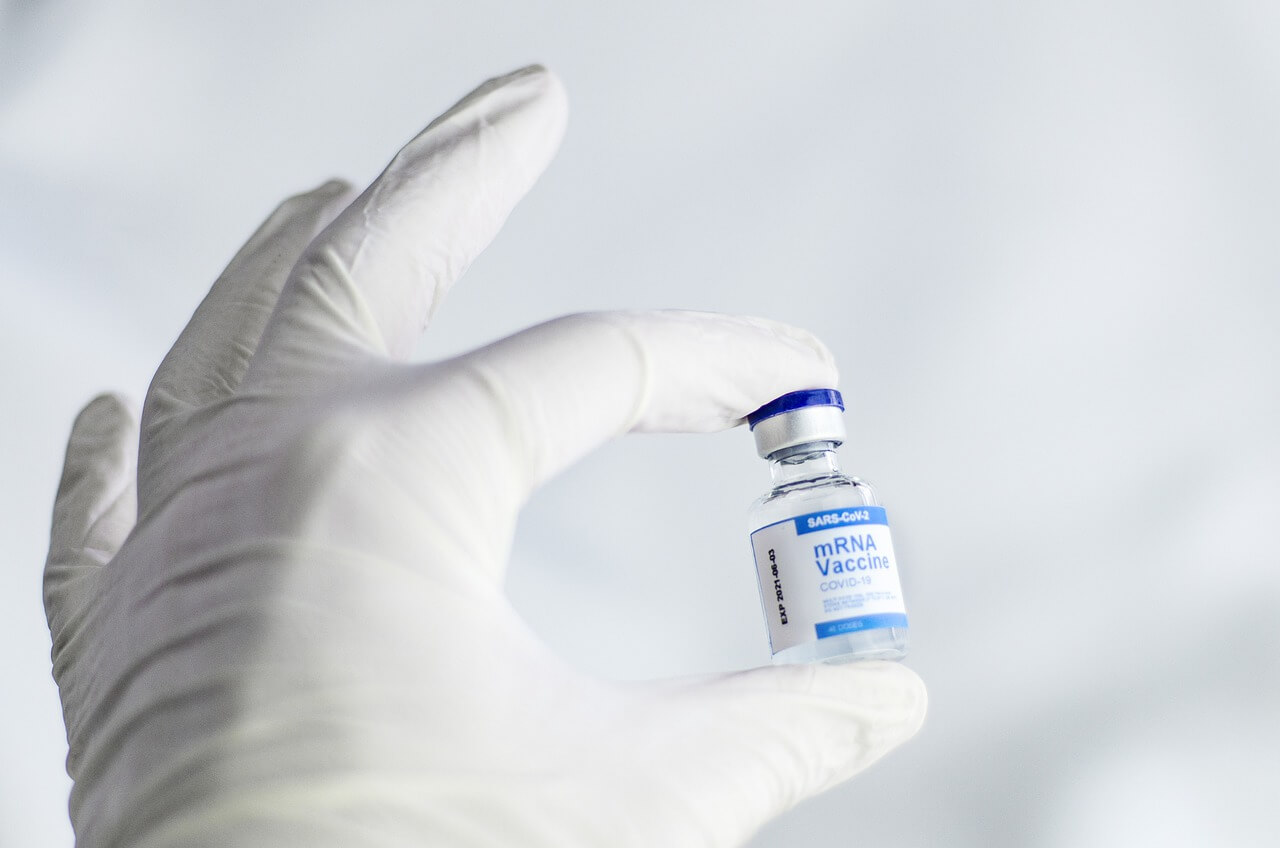
COVID-19 vaccine © Pixabay
In summary, there are currently more vaccines in Croatia than there are people interested in. It's hard to believe how things progressed from the start of the year when we witnessed a delay in vaccine shipments, outrage by the public when people such as Zagreb University Rector Damir Boras received the vaccine ahead of time and schedule. From the malfunctioning Cijepi se (Vaccinate yourself) website where you had to register for an appointment (which took forever to get) to a family doctor being able to sign you up, all the way to be able to take a shot without an appointment today, vaccines truly became accessible for everyone. There were even buses bringing vaccines and performing vaccinations in remote villages. So vaccines are for everyone to take, but is it really so?
Nothing in the world is perfect, and neither is Croatia. From time to time, we can see that some groups in Croatian society do get discriminated against or suffer negative stereotypes. For example, with significant progress in accepting the LGBTQ community, sadly homophobic attacks still happen. The tensions with the Serbian minority vary from the day-to-day political agenda, but it is safe to say no one has it worse than the Roma people in Croatia.
As TCN previously wrote, following the 2020 report by Human Rights House in Zagreb, Roma people in Croatia are still facing many obstacles in achieving their rights, which include employment, access to services, and adequate living standards, and there is still segregation in the education system too. Either perceived as thieves, criminals, beggars or completely ignored in Croatia, the question of how many Roma people in Croatia received the vaccine and how many Roma people want the vaccine in the first place, can't be left aside, as it shows how much the vaccine rollout truly is fair for every citizen in the country.
Disinformation crippled 80% of those willing to get the vaccine
Veljko Kajtazi, a member of the Croatian parliament, elected as a representative of the Roma community, says that official research of percentage of vaccinated Roma people hasn't been conducted, but he frequently goes „to the field“, and sees that the situation isn't good.
„If 45% of the Croatian population is vaccinated, I can say that Roma people are a very small percentage of that number“, commented Kajtazi, then on a relevant number of vaccinated people.
He supports the talk of obligatory vaccines and finds disinformation and fake news regarding vaccines to be the cause of low interest.
 Veljko Kajtazi, screenshot / Hrvatska radiotelevizija
Veljko Kajtazi, screenshot / Hrvatska radiotelevizija
„Roma people have a very social culture, love gatherings, and live in big families. When the pandemic started, I cooperated with authorities in ensuring that social distancing measures are respected in Roma settlements and that we educate people on the dangers of coronavirus“, recalled Kajtazi.
While Roma people can be found living anywhere, the majority is often ghettoized. An example is in Zagreb, where the Kozari Bok neighborhood on the east side of the city is famous for its big Roma population. When looking outside of the capital city, there are many Roma villages and settlements which count more people than other Croatian villages.
One such place is Piškorovec in Međimurje, which the Lupiga news site referred to as „the biggest Croatian ghetto“. Their article detailed both living in Piškorovec and tensions with the nearby town of Čakovec underlining incidents and division between Roma and Croatians (as Roma People are often perceived as thieves or beggars).
„Last year 80% of Roma people wanted to take the vaccine, but today, they are scared and believe various conspiracy theories. People are not informed, and social networks spread so much disinformation“, Kajtazi pictured how wishing for a vaccine turned sideways.
In the end, he added that he is regularly in contact with the government and institutions to provide information on vaccines to the community. Katja also hopes the vaccine buses will come to Roma villages too.
Questions for HZJZ
The lack of information, geographical isolation, and the overall achievement of social rights (such as health insurance) like other Croatian citizens that the Human Rights House in Zagreb expressed in their report left a lot of open questions regarding Roma people vaccination. Particularly, are there any statistics on how many people vaccinated that the health officials might have, what is the mood towards vaccines in Roma communities in their view, and can buses come to isolated areas to vaccinate Roma people? The inquiry was sent to the Health Ministry and to the Croatian Public Health Institute (HZJZ). Health Ministry very quickly forwarded the inquiry to the Croatian Public Health Institute (HZJZ) as these questions are part of their domain. The health ministry even forwarded the questions directly to the HZJZ headmaster Krunoslav Capak himself and other close associates on e-mail addresses not visible on the HZJZ website. But, HZJZ hasn't responded yet. Whether I tried to remind them and ask when can they answer via e-mail or phone calls, none left a response (although a phone call with HZJZ PR service confirmed there are experts in HZJZ that deal with the health of vulnerable social groups, which includes Roma People).
When the answer that can be expected for the moment remains unknown, but TCN will publish HZJZ's response when we receive it.
In the meantime, as we can see, despite vaccine skepticism being strong, there is nevertheless a slow but steady daily rise of vaccinated people in Croatia.
Let's hope for the sake of public health that disinformation and fake news that turn people away from the vaccines will lower its influence on all the cultural groups and identities you can find in Croatia.
Editor's note: HZJZ response
Learn more about travelling to Croatia during the COVID-19 pandemic on our TC page.
For more about COVID-19 in Croatia, follow TCN's dedicated page.
Croatia Logs 146 New Coronavirus Cases, 3 Deaths
ZAGREB, 20 July, 2021 - In the past 24 hours, 146 coronavirus cases and three deaths have been registered in Croatia, the national COVID-19 crisis management team said on Monday.
There are 739 active cases, including 121 hospitalised patients, 11 of whom are on ventilators, while 3,573 persons are self-isolating.
To date, Croatia has registered 361,759 coronavirus cases, including 8,243 deaths and 325,777 recoveries, 89 of which in the past 24 hours.
To date, Croatia has tested 2,223,324 persons for the virus, including 4,612 in the past 24 hours.
Also, 2,930,768 vaccines have been administered and 39.3% of the population has been vaccinated, including 47.2% of the adult population.
For more about COVID-19 in Croatia, follow TCN's dedicated page.


